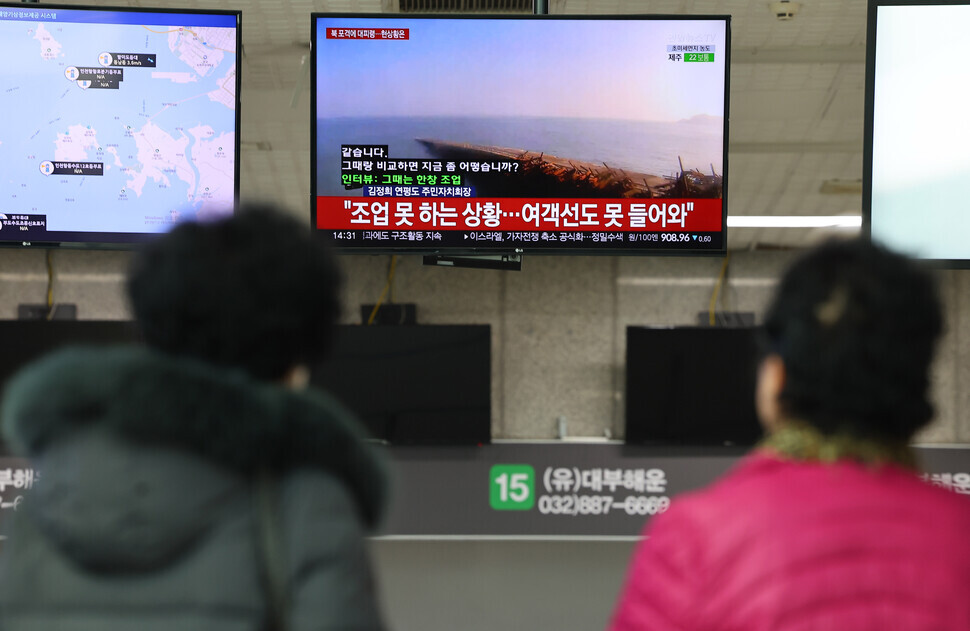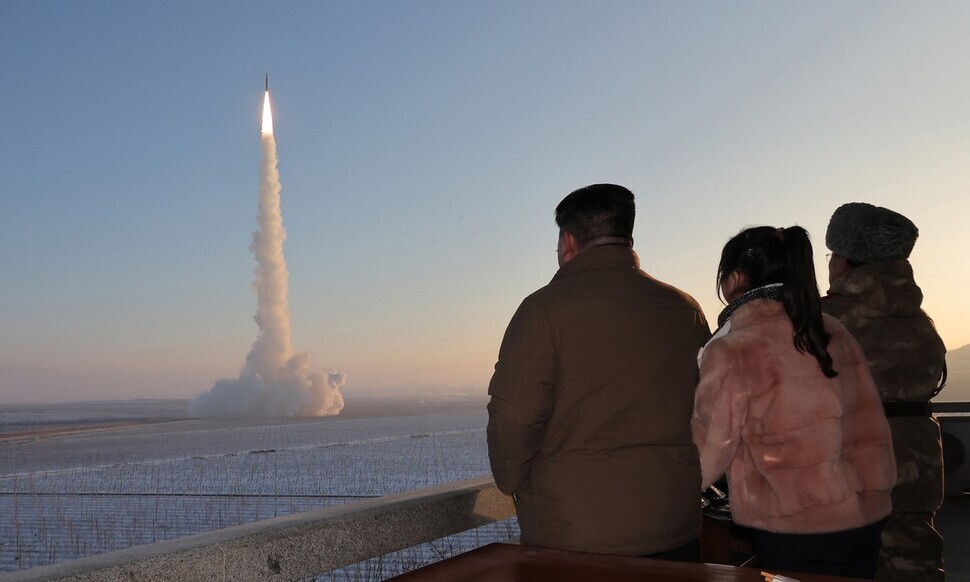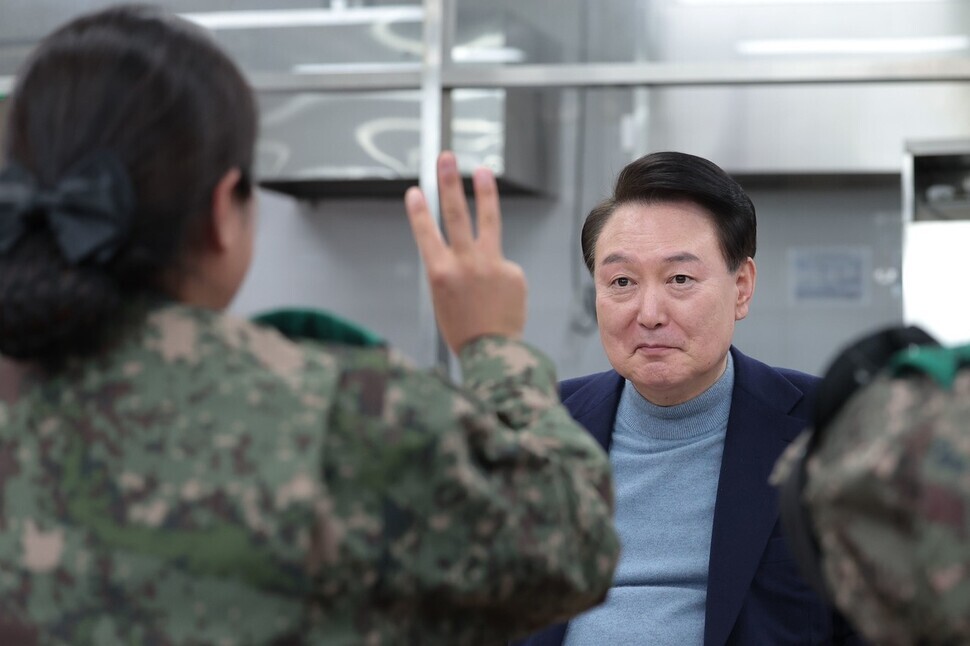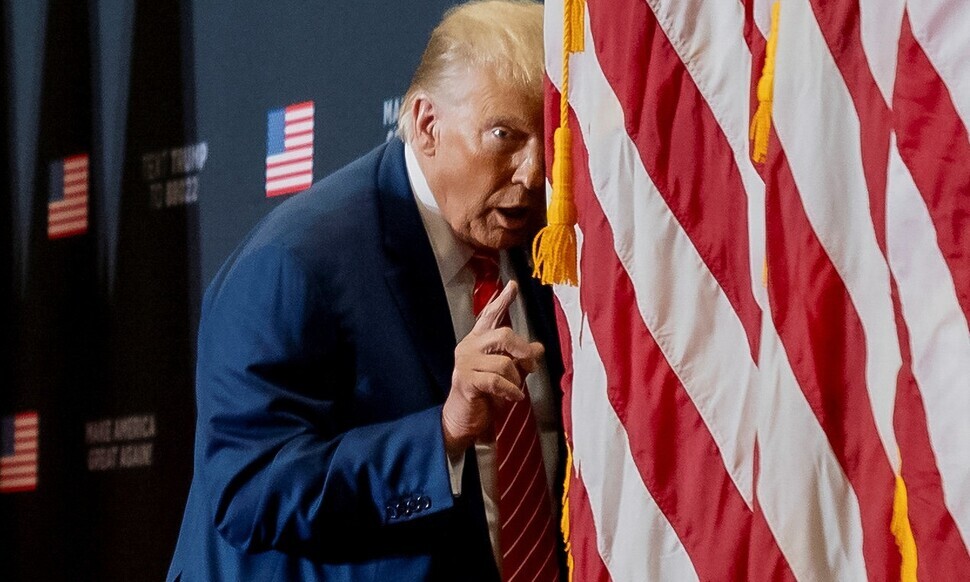hankyoreh
Links to other country sites 다른 나라 사이트 링크
[Column] On Korean Peninsula, each passing day is a game of chicken

The end-of-the-year holiday season was rife with news around the world predicting a new year full of escalating wars and arms races.
To begin with, the war between Russia and Ukraine has become drawn-out, entering its 23rd month. Ukraine, despite having successfully launched a counteroffensive with extensive support from Western forces in the summer of 2023, hit a dead end through the fall and winter.
While the US and EU are feeling fatigued from continuous military support and internal conflicts are deepening, Russia is confident that it is on its way to victory.
There also seems to be no end on the horizon for the war in Gaza, which started on Oct. 7, 2023, with Hamas' surprise attack and Israel’s merciless retaliation.
Adding to an already tense global situation, armed conflicts and terrorist attacks in the Red Sea, Lebanon, Iran and elsewhere are raising fears of more potential wars in those regions.
When we try to avert our eyes from all that chaos and focus on the Korean Peninsula, we can find no relief from the anxieties of war. The abrupt end to the peace process established on the Korean Peninsula in 2018 and 2019 is opening the stage for the worst military arms race in history.
To make matters worse, political and military hostilities, as well as the arms race, have reached their worst level since the Yoon Suk-yeol administration took office in May 2022.
The two Koreas started the new year by engaging in a series of provocations: the US and South Korea have conducted military exercises on land, sea, and air, mobilizing many weapons and equipment, to which North Korea responded with naval drills in the West Sea.

In the past, crises would escalate and then be defused by dialogue, but in recent years, attempts at dialogue have virtually disappeared while risky situations have become the norm. The sense that a crisis of war is on its way is permeating every corner of our society, with more and more people anxious that an actual war will break out on the Korean Peninsula.
It must be noted that the Russo-Ukrainian war and the situation on the Korean Peninsula are closely linked. In 2023, major US media outlets reported that the amount of 155 mm artillery shells sourced from South Korea that the US supplied to Ukraine exceeded that of all European countries.
Russia, which had closely monitored these developments and warned of a breakdown in relations between it and South Korea, suddenly joined hands with North Korea. Military cooperation began in earnest around the time of the North Korea-Russia summit in September 2023, and the US believes that North Korea has provided Russia with not only artillery shells but also ballistic missiles and launchers.
These developments mean that North and South Korea are becoming major arms suppliers for the war on the other side of Eurasia.
We also need to step back and look at the bigger picture, such as by inspecting the clash between Yoon Suk-yeol’s “values-based solidarity” and Kim Jong-un’s “anti-US solidarity.”
In addition to indirect support for Ukraine, the Yoon administration has been preoccupied with the US-led Indo-Pacific strategy, pursuing a quasi-trilateral alliance with the US and Japan, and strengthening ties with NATO.
While the administration has touted values such as freedom, human rights, and a market economy, it has actually prioritized alliances, to disastrous results.
Relations with North Korea, China, and Russia are all at their worst since the 1990s, and the US, which had helped Seoul materially and otherwise, is on its way to a silent fall from grace.
More and more countries are turning their backs on the US for its failure to prevent war and the pursuit of a quick ceasefire in Ukraine. This trend is being exacerbated by the fact that the US is willingly protecting Israel diplomatically, as well as providing the country with massive arms shipments, despite the fact that Israel is committing war crimes in Gaza.
North Korea, which has abandoned the hope of improving relations with the US and has embraced a thoroughly anti-US stance, is taking advantage of this situation.
It sees the two wars and the strategic competition between the US and China as an opportunity to transition to a multipolar world system, and it is determined to “further developing the relations with the anti-imperialist independent countries opposed to the hegemony strategy of the US and the West.”

Such confidence demonstrated by North Korea is not only being driven by changes in its external environment. North Korea’s nuclear and missile capabilities are growing stronger, to the point of almost universal recognition and concern.
But what needs to be noted is the striking development the country has made in the livelihood of its people and the country’s economy, with North Korea using the phrase “bumper crop” to describe the growth in its crop yield in 2023.
At a gathering of the ruling Workers’ Party of Korea at the end of last year, it was announced that the country had exceeded the 12 goals it had set for itself in 2023, and that its gross domestic product for 2021-2023 had increased by “1.4 times” compared to 2020.
If true, this assessment suggests that North Korea is emerging from chronic food shortages and economic difficulties. A new North Korea is emerging from the military, diplomatic and economic sectors.
The biggest concern of 2024 is the possibility of armed conflict breaking out on the Korean Peninsula. Currently the Korean Peninsula is in such a high state of military crisis, it would not be surprising to see armed clashes arise at any time and any place.
The South Korea-US alliance has vowed an overwhelming and powerful response that will bring about the “end” of the regime were North Korea to resort to using nuclear weapons, and the Yoon administration has promised to respond to North Korea’s provocations “swiftly, definitively and with great force.”
North Korea’s rhetoric is also becoming more and more belligerent. At the gathering of the Workers’ Party of Korea last month, North Korean leader Kim Jong-un stated that “confrontational military acts perpetrated by the hostile forces” could lead to a war breaking out at any time, and informed the North Korean military that, in the event of war, it should be ready to “suppress the whole territory of south Korea.”
Both North and South Korea have abandoned their efforts towards peaceful reunification and are now engaging in a dangerous game of chicken, in which they talk of a reunification brought about through war.
The danger the Korean Peninsula faces is multi-layered. It has been more than five years since any kind of dialogue happened between the two Koreas or between the US and North Korea.
The vacuum opened up by the lack of dialogue is being filled by an intense arms race and belligerent rhetoric. There is no trace of a mediator between the two Koreas, and the US and China have also lost a lot of interest in policies concerning the Korean Peninsula.
To rub salt in an already aching wound, the Sept. 19 inter-Korean military agreement signed in 2018, which acted as a buffer against accidental military conflicts through military distancing, has been nullified at a time when political and military hostility between the two Koreas is at its worst.
The largest-ever joint military exercises between the US and South Korea, or the US, South Korea and Japan, are supposedly coming in 2024, to which North Korea has warned of a strong retaliation.
There are also concerns about North Korea’s response to the resumption of sending propaganda balloons into North Korea and loudspeaker broadcasts. However, there is a silver lining: While the US has previously stated that since “all options are on the table,” it was also considering preemptive strikes when it comes to stopping North Korean nukes, it has since taken that option off the table.
This signifies that the possibility of war, which has been hovering over the Korean Peninsula for the past few decades, now depends on inter-Korean relations rather than US-North Korea relations.
Despite such a shift, both Koreas are failing to focus on preventing war and crisis management, and are instead busy taunting and provoking each other.

The troubled situation that kicked off this year with invective and shows of force appears very likely to continue throughout 2024. The crisis on the peninsula is expected to spike in August, when South Korea and the US are scheduled to hold nuclear operation drills.
North Korea, which has opted for an “eye for an eye, tooth for a tooth” military response since the latter half of 2023, is also likely to counter with its own nuclear warfare exercises.
South Korea, the US and North Korea all believe that the way to preserve peace is by instilling as much fear as possible into the adversary — but the lesson we draw from history is that wars can erupt in the process, due to human misjudgments and misunderstandings or mechanical malfunctioning.
Another focus of attention is on the elections that are happening all over the world this year. Two elections are particularly consequential for the political situation on the Korean Peninsula.
One of those is the Taiwanese election to select a president and parliament on Jan. 13. The Democratic Progressive Party’s success in winning reelection is poised to fuel uncertainties in East Asia and the international political situation tied to it.
A crisis in Taiwan stands to pose an additional burden for relations between South Korea and China, which are already in the worst state in their history. The biggest reason for the souring between Seoul and Beijing is the fact that the Yoon Suk-yeol administration has consistently defended Washington’s position on Taiwan-related issues.
Meanwhile, North Korea, which has been the strongest supporter of Beijing’s position on Taiwan issues, is likely to see a crisis there as an opportunity — just as it spotted the opportunity presented as the Russo-Ukrainian war dragged on.
The biggest focus of global attention this year is the US presidential election in November. All around the world, people are watching to see whether former President Donald Trump successfully returns to the White House. The Korean Peninsula is no exception, as it was one of the regions that were most heavily affected when he was in office before.
Throughout the first year of his term in 2017, Trump fanned the crisis on the Korean Peninsula with an all-out faceoff against Kim Jong-un. In 2018, he became the first US president to meet with the leader of North Korea. Between that year and 2019, the two of them met three times for the negotiations of the century.
In the case of South Korea, Trump used the threat of withdrawing US Forces Korea as business leverage, as he worked to increase weapon sales and the South’s contribution to defense funds. What sort of impact would his return to the White House have on the Korean Peninsula’s political situation?
What’s clear is that a second term would be a very different ballgame from the first. The biggest changes are taking place in North Korea.
In the past, Pyongyang desperately wanted to get closer with the US. When Kim Jong-un rushed to “complete national nuclear armament” in 2017 — even at the risk of starting a war — this was because he wanted to negotiate with Trump after establishing as much of a balance of power as possible.
But over the course of 2019, his attitude shifted from pro-US to anti-US, after he concluded that he had been betrayed and made a fool of by the Trump administration. Trump also saw North Korea’s difficult economic situation and the presence of sanctions as strong bargaining chips to extract concessions from Kim.
Now, even that situation has changed. North Korea is treating sanctions as an excellent “opportunity” to achieve self-sufficiency and regeneration through its own efforts. It is also confident that it has accomplished a fair amount on that front.
Not only that, but Pyongyang has also declared an end to denuclearization, putting a legislative stamp on its status as a “final and irreversible” nuclear power while boosting its intercontinental ballistic missile and other nuclear missile capabilities.
If any meeting does take place between Kim and Trump, the topics under discussion are likely to include a freeze of North Korea’s nuclear program and ICBMs and the suspension of South Korea-US joint military exercises and the deployment of US strategic assets. This is the so-called “arms control model.”
Trump is expected to boast of how such a deal heads off North Korea achieving full ICBM capabilities, while the resulting improvements in relations with Pyongyang put the US in a more beneficial position in its competition with China.
A more definite prospect than this is that Trump will lean heavily on the Yoon administration to increase South Korea’s share of defense costs. He may order the reduction or suspension of joint military exercises, citing the large price tag; he may also mention the possibility of withdrawing US troops from Korea.
The convergence of these events is likely to spark vocal calls in South Korea for us to establish our own independent nuclear capabilities. As long as the possibility of Trump returning cannot be ruled out, these are issues we are going to have to wrestle with this year.
By Cheong Wook-Sik, director of the Hankyoreh Peace Institute and director of the Peace Network

Editorial・opinion
![[Guest essay] Preventing Korean Peninsula from becoming front line of new cold war [Guest essay] Preventing Korean Peninsula from becoming front line of new cold war](https://flexible.img.hani.co.kr/flexible/normal/500/300/imgdb/original/2024/0507/7217150679227807.jpg) [Guest essay] Preventing Korean Peninsula from becoming front line of new cold war
[Guest essay] Preventing Korean Peninsula from becoming front line of new cold war![[Column] The state is back — but is it in business? [Column] The state is back — but is it in business?](https://flexible.img.hani.co.kr/flexible/normal/500/300/imgdb/original/2024/0506/8217149564092725.jpg) [Column] The state is back — but is it in business?
[Column] The state is back — but is it in business?- [Column] Life on our Trisolaris
- [Editorial] Penalties for airing allegations against Korea’s first lady endanger free press
- [Editorial] Yoon must halt procurement of SM-3 interceptor missiles
- [Guest essay] Maybe Korea’s rapid population decline is an opportunity, not a crisis
- [Column] Can Yoon steer diplomacy with Russia, China back on track?
- [Column] Season 2 of special prosecutor probe may be coming to Korea soon
- [Column] Park Geun-hye déjà vu in Yoon Suk-yeol
- [Editorial] New weight of N. Korea’s nuclear threats makes dialogue all the more urgent
Most viewed articles
- 1Behind-the-times gender change regulations leave trans Koreans in the lurch
- 2South Korean ambassador attends Putin’s inauguration as US and others boycott
- 3Yoon’s revival of civil affairs senior secretary criticized as shield against judicial scrutiny
- 4Family that exposed military cover-up of loved one’s death reflect on Marine’s death
- 5Hybe-Ador dispute shines light on pervasive issues behind K-pop’s tidy facade
- 6[Guest essay] Preventing Korean Peninsula from becoming front line of new cold war
- 7Yoon’s broken-compass diplomacy is steering Korea into serving US, Japanese interests
- 8Japan says its directives were aimed at increasing Line’s security, not pushing Naver buyout
- 91 in 10 marriages in Korea last year was with a foreign national
- 10[Editorial] New weight of N. Korea’s nuclear threats makes dialogue all the more urgent